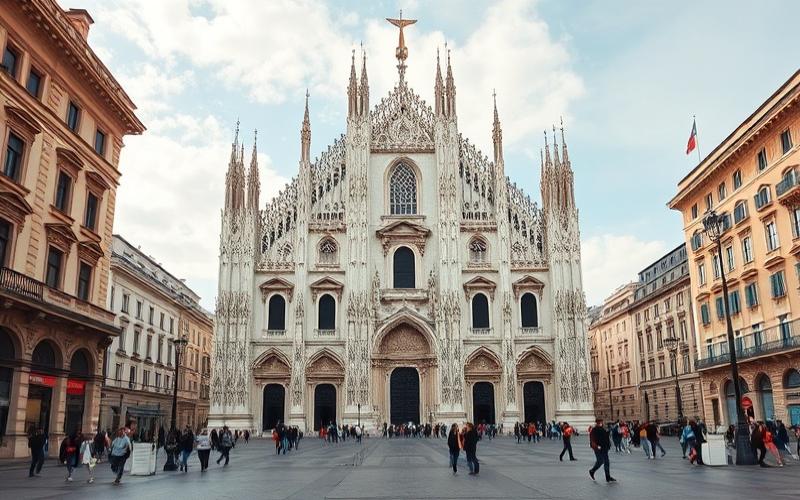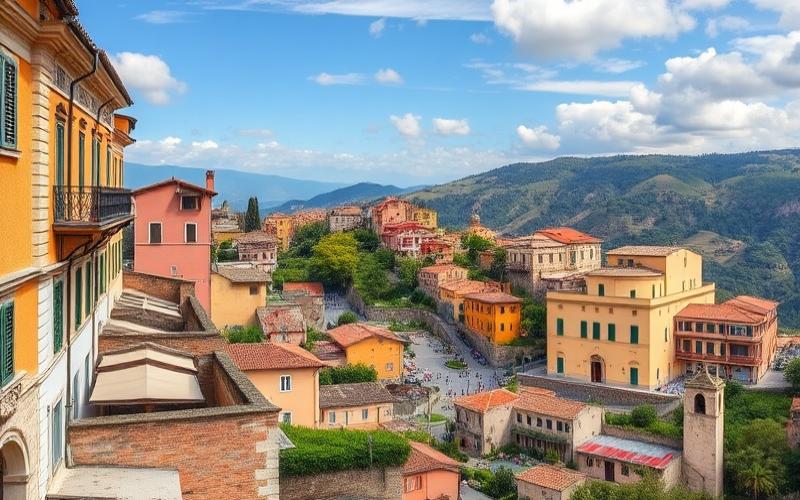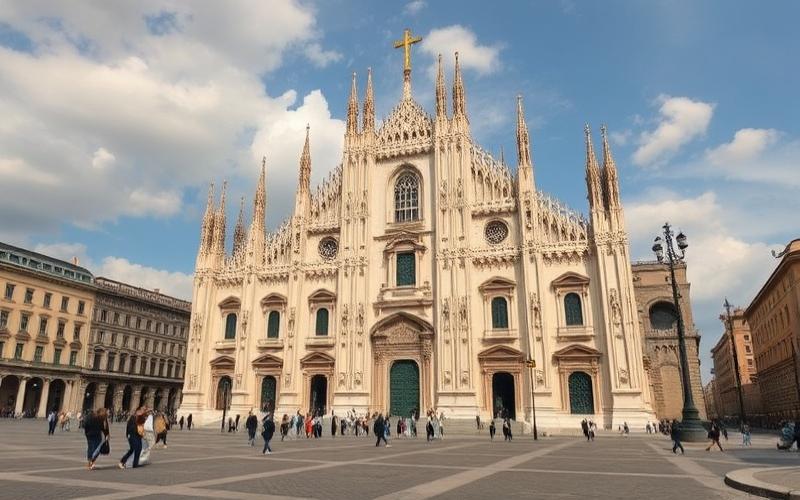
 Published on and written by Cyril Jarnias
Published on and written by Cyril Jarnias
Italy, with its rich cultural heritage, picturesque landscapes, and enviable lifestyle, attracts many foreign investors eager to acquire real estate. Whether for a secondary residence, rental investment, or life project, the Italian real estate market offers excellent opportunities. However, the purchasing process for foreigners has its particularities and requires a good understanding of local rules and procedures. In this article, we will explore in detail the key steps, legal obligations, and tax considerations to keep in mind to realize your real estate dream in Italy.
Real Estate Dolce Vita: Can Foreigners Buy Property in Italy?
The good news for foreign investors is that Italy, as a member of the European Union, applies the principle of freedom of establishment and non-discrimination. This means that foreign nationals, whether from the EU or third countries, can acquire real estate in Italy under conditions similar to those for Italian citizens.
A Favorable Legal Framework
Unlike some countries that impose strict restrictions on foreign buyers, Italy stands out for its openness. There is no specific legislation governing foreign direct investment in real estate. The applicable regime is aligned with that for local investors, which greatly simplifies the acquisition process.
Exceptions to Be Aware Of
Although the market is generally open, there are a few sectors where special permits may be required. This is particularly the case for investments in telecommunications, press, energy, or airline and shipping companies. In these particular cases, prior authorization from the competent ministry may be necessary, and restrictions on the amount of shareholdings may apply.
Reciprocity, a Principle to Consider
It’s important to note that the principle of reciprocity may apply for nationals of non-EU countries. This means that citizens of countries that do not allow Italians to buy real estate in their country could face similar restrictions in Italy. However, in practice, this principle is rarely applied strictly, and most foreign buyers do not encounter major obstacles.
Good to Know:
Italy offers a favorable legal environment for foreign real estate investors, with few restrictions. However, it is always recommended to check the specific conditions applicable to your personal situation and the type of property you wish to acquire.
Acquiring real estate in Italy requires the preparation and submission of several key documents. This step is crucial to ensure the transaction proceeds legally and without hitches. Here is an overview of essential documents and procedures for foreign buyers:
The Codice Fiscale: Your Entry Key
The first essential document for any foreign buyer is the codice fiscale, the Italian equivalent of the tax identification number. This code is necessary to perform virtually all financial transactions in Italy, including purchasing real estate. You can obtain it from the Agenzia delle Entrate (the Italian tax agency) or through the Italian embassy or consulate in your country of residence.
Identification and Supporting Documents
In addition to the codice fiscale, you will need to provide:
- A copy of your valid passport
- A recent proof of address (less than 6 months old)
- A certificate of your marital status
- For Italian citizens residing abroad, an AIRE registration certificate (Anagrafe Italiani Residenti all’Estero)
Financial Documents
To prove your financial capacity to acquire the property, you will generally need to provide:
- Your latest tax returns
- Bank statements from the last 6 to 12 months
- Proof of funds you plan to use for the purchase
- If you are employed, your latest pay slips and employment contract
The Preliminary Sales Agreement (Compromesso)
Once you’ve found your dream property and reached an agreement with the seller, the first formal step is signing the preliminary sales agreement. This legally binding document details the sale conditions, agreed price, and scheduled date for signing the final deed. It is highly recommended to hire a lawyer for the drafting and verification of this document.
The Notarial Deed (Atto Notarile)
The final step in the purchase process is signing the notarial deed before an Italian notary. This document formalizes the property transfer. The notary will verify all documents, ensure the transaction’s legality, and proceed with registering the sale with the competent authorities.
Specific Procedures for Non-Residents
If you are not a tax resident in Italy, you may need to provide additional documents, such as a certificate of non-fiscal residence from your home country. Additionally, it is advisable to check if there are double taxation agreements between your country of residence and Italy, which could impact your tax situation.
Good to Know:
Careful preparation of all required documents can significantly speed up the purchase process. It is highly recommended to work with a lawyer specialized in Italian real estate law to ensure all legal aspects are properly handled.
The Tax Maze: Understanding Italian Real Estate Taxation
Taxation is a crucial aspect to consider when buying real estate in Italy, especially for foreign investors. The Italian tax system may seem complex at first, but a good understanding of the main taxes and obligations can help you effectively plan your investment.
Acquisition-Related Taxes
When purchasing real estate in Italy, you will be subject to several taxes:
- Imposta di registro (Registration Tax): Generally set at 9% of the property’s cadastral value for a secondary residence, it can be reduced to 2% for the purchase of a primary residence.
- IVA (VAT): If you buy directly from a developer, you will pay VAT (generally 10%, but may vary depending on property type) instead of the registration tax.
- Imposta ipotecaria e catastale: These mortgage and cadastral taxes are generally fixed at 50 euros each for a primary residence, but can amount to 2% and 1% respectively of the cadastral value for other types of properties.
Annual Property Taxes
Once you become an owner, you will be subject to annual taxes:
- IMU (Imposta Municipale Unica): This is the main property tax, calculated based on the property’s cadastral value. Rates vary by municipality but generally range between 0.4% and 1.06% of the cadastral value.
- TARI (Tassa sui Rifiuti): This tax covers waste collection and is based on the property’s surface area and number of occupants.
- TASI (Tassa sui Servizi Indivisibili): An additional tax for municipal services, although it has been largely merged with IMU in many municipalities.
Taxation of Rental Income
If you plan to rent out your property, the generated income will be taxable in Italy. For non-residents, a flat rate of 21% generally applies to gross rental income. However, there are advantageous tax regimes, such as the “cedolare secca,” which allows under certain conditions to opt for a fixed and reduced tax rate.
Real Estate Capital Gains
In case of property resale, realized capital gains may be subject to tax in Italy. However, if you held the property for more than five years, the capital gain is generally exempt. For properties held for shorter periods, the tax rate is 26% on the realized capital gain.
International Taxation and Tax Treaties
For foreign investors, it is crucial to consider the tax implications in their country of residence. Italy has concluded tax treaties with many countries to avoid double taxation. These agreements can influence how your Italian real estate income is taxed in your home country.
Declaration of Foreign Assets
Italian tax residents are required to declare their assets held abroad via the RW form. Although this obligation does not directly concern non-residents buying in Italy, it may become relevant if you decide to settle in Italy in the future.
Good to Know:
Italian real estate taxation can be complex, especially for foreign investors. It is highly recommended to consult a tax expert familiar with Italian and international rules to optimize your tax situation and ensure you meet all your obligations.
Acquiring real estate in Italy comes with a set of specific rules and obligations that every foreign investor should know. These regulations aim to protect both buyers and the Italian real estate heritage. Here are the essential points to remember:
Restrictions in Certain Areas
Although Italy is generally open to foreign investors, certain areas may be subject to special restrictions. For example, purchasing real estate in border areas or areas considered strategic may require special permits. Similarly, certain historical properties or those located in heritage protection zones may be subject to specific rules regarding their use and renovation.
Renovation Obligation for 1 Euro Houses
Italy has made headlines with its initiative to sell houses for 1 euro in certain rural municipalities. While this offer may seem tempting, it comes with strict obligations. Buyers must commit to renovating the property within a set timeframe, generally between one and three years. A detailed renovation project must be presented to the municipality, accompanied by a deposit that will be refunded once the work is completed.
Urban Planning Rules and Building Permits
If you plan renovation or extension work, it is crucial to familiarize yourself with local urban planning rules. Each municipality has its own regulations regarding modifications that can be made to buildings, especially in historic centers or protected areas. Obtaining a building permit (permesso di costruire) is generally necessary for major work.
Energy Certification
Since 2013, all real estate properties offered for sale or rent in Italy must have an energy performance certificate (Attestato di Prestazione Energetica – APE). This document, which assesses the property’s energy efficiency, must be provided to potential buyers or tenants.
Declaration Obligations for Non-Residents
Non-resident owners have specific declaration obligations in Italy. Even if you don’t generate rental income, you generally must submit an annual tax return for your real estate property. This obligation allows Italian authorities to track property ownership by foreigners.
Rental Rules
If you plan to rent out your property, whether long-term or seasonal rentals, you must comply with local and national regulations. This may include registration with local authorities, compliance with safety standards, and in some cases, obtaining specific licenses for tourist rentals.
Protection of Historical Heritage
Italy is renowned for its rich architectural heritage. If you buy a listed property or one located in a historical area, you may be subject to restrictions regarding modifications you can make to the property. These rules aim to preserve the architectural and historical integrity of the building and its environment.
Retention of Title Clause
Under Italian law, the retention of title clause is an important legal tool, particularly in sales with installment payments. This clause, which must be stipulated in writing at the time of contract conclusion, allows the seller to retain property ownership until full payment of the price. It offers additional protection to the seller and can influence the transaction structure.
Good to Know:
Real estate rules and obligations in Italy can vary significantly by region and property type. It is strongly recommended to work with local professionals (lawyer, real estate agent, notary) who are well acquainted with the specificities of the area where you wish to invest.
Financing Your Italian Dream: Options and Considerations for Foreign Buyers
Financing is often a crucial aspect of real estate purchase, and for foreign investors in Italy, it presents unique challenges and opportunities. Understanding the available options and specificities of the Italian market can help you structure your investment optimally.
Italian Mortgages for Non-Residents
Italian banks offer mortgages to foreign buyers, although conditions may be stricter than for Italian residents. Here are some key points to consider:
- Financing rate: Generally, Italian banks limit financing to 60-70% of the property value for non-residents, compared to 80% or more for residents.
- Loan term: Loans for non-residents are often limited to 10-20 years, compared to 25-30 years for residents.
- Interest rates: Rates may be slightly higher for non-residents, reflecting the perceived higher risk.
- Life insurance: Life insurance is generally required to cover the loan amount.
Documents Required for an Italian Loan
To obtain a mortgage in Italy, you will need to provide comprehensive documentation, including:
- Copy of passport and codice fiscale
- Proof of income (tax returns, pay slips)
- Bank statements from the last 6-12 months
- Details on your existing assets and liabilities
- Information about the property you wish to purchase
Financing in Your Home Country
An alternative to an Italian loan is to obtain financing in your country of residence. This option can offer several advantages:
- Potentially simpler and more familiar process
- Possibility of more favorable interest rates
- Increased flexibility in loan conditions
However, you must consider exchange rate risks if your loan is not in euros.
Tax Considerations of Financing
Your financing strategy choice can have important tax implications:
- Interest deductibility: Interest paid on an Italian mortgage may be partially deductible from rental income in Italy.
- Impact on capital gains: Financing can influence capital gains calculation in case of resale.
Refinancing Options
Once you become an owner, you might consider refinancing your property to take advantage of better rates or free up funds. The Italian refinancing market (surroga) has developed in recent years, offering more flexibility to property owners.
Special Programs for Foreign Investors
Some Italian banks have developed specific programs for foreign buyers, offering services in foreign languages and dedicated assistance throughout the process. These programs can greatly facilitate navigating the Italian banking system.
The Notary’s Role in Financing
In Italy, the notary plays a central role in the real estate transaction, including aspects related to financing. They will verify the transaction’s legality, ensure the loan is properly registered, and that guarantees are in place.
Good to Know:
Financing your real estate purchase in Italy requires careful planning. It is advisable to start your financing procedures well before making an offer on a property. Compare options between Italian banks and those in your home country, and don’t hesitate to consult a financial advisor familiar with international transactions.
Conclusion: Realizing Your Italian Real Estate Dream with Peace of Mind
Acquiring real estate in Italy represents an exciting opportunity for foreign investors, offering not only financial return potential but also the promise of an enviable lifestyle. However, as we’ve seen throughout this article, the process comes with its own challenges and particularities.
An Accessible but Complex Market
Italy stands out for its openness to foreign investors, with few formal restrictions on real estate purchases. This accessibility, combined with the country’s cultural richness and beauty, makes it a preferred destination for many international buyers. Nevertheless, the complexity of the Italian legal and tax system requires a cautious and well-informed approach.
The Importance of Meticulous Preparation
The key to success in your Italian real estate project lies in meticulous preparation. This involves:
- A thorough understanding of purchase procedures and required documents
- Familiarization with the Italian tax system and its implications for non-residents
- Knowledge of specific rules and obligations related to real estate ownership in Italy
- A well-thought-out financing strategy, adapted to your personal situation
The Crucial Role of Local Professionals
The assistance of experienced professionals is invaluable in your purchasing journey. A lawyer specialized in Italian real estate law, a competent notary, and possibly a tax advisor familiar with international issues can guide you through the complexities of the process and help you avoid potential pitfalls.
A Long-Term Vision
Investing in Italian real estate is not limited to the act of purchase. It’s a long-term commitment that may involve ongoing responsibilities in terms of property management, tax compliance, and possibly renovation. A clear vision of your long-term goals – whether it’s a secondary residence, rental investment, or retirement project – will help you make informed decisions at every step.
An Investment in the Italian Lifestyle
Beyond financial and legal considerations, buying property in Italy is often motivated by the desire to immerse oneself in Italian culture. Whether it’s an apartment in a historic city, a villa on the coast, or a country house in the Tuscan hills, your Italian property can become a gateway to a new lifestyle, rich in cultural, culinary, and social experiences.
By following the advice and information presented in this article, you will be well equipped to navigate the sometimes turbulent waters of Italian real estate. With proper preparation and adequate support, your dream of property under the Italian sun can become a rewarding and enriching reality.
Good to Know:
Buying real estate in Italy is a process that requires time, patience, and a good dose of diligence. However, the rewards – both in terms of quality of life and investment potential – can largely compensate for the efforts invested. Take the time to inform yourself properly, surround yourself with the right professionals, and prepare to embrace the Italian dolce vita!
Disclaimer: The information provided on this website is for informational purposes only and does not constitute financial, legal, or professional advice. We encourage you to consult qualified experts before making any investment, real estate, or expatriation decisions. Although we strive to maintain up-to-date and accurate information, we do not guarantee the completeness, accuracy, or timeliness of the proposed content. As investment and expatriation involve risks, we disclaim any liability for potential losses or damages arising from the use of this site. Your use of this site confirms your acceptance of these terms and your understanding of the associated risks.













































